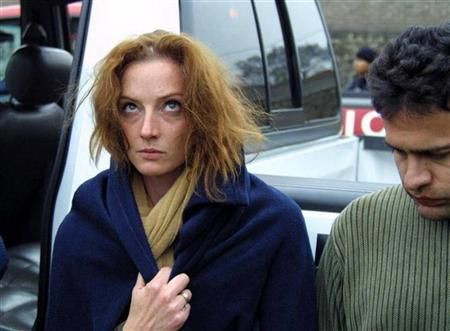
(Reuters) - Mexico's Supreme Court on Wednesday will review the case of a French woman serving a 60-year sentence for kidnapping, a conviction that has caused a long-running diplomatic spat with France.
Florence Cassez, 38, was convicted in 2008 for participating in a kidnapping ring, but the legal process was riddled with irregularities, prompting criticism of Mexico's justice system and protests from France over her treatment.
The hearing before the Supreme Court could set the scene for an early release, if the five-judge panel agrees to discount some of the evidence used to convict her.
Critics of Mexican justice see the Cassez case as a test of the system's ability to rectify its faults.
"It would speak well of the system, because it would correct something that was badly handled from the outset," said Luis Angel Benavides, a law professor at Mexico City's ITAM university.
Cassez, who maintains her innocence, was arrested in December 2005 at a ranch near Mexico City with her ex-boyfriend, Israel Vallarta, who led a kidnapping gang called the Zodiacs.
After the arrest, police made Cassez take part in a staged scene of officers freeing kidnap victims. She was portrayed as a kidnapper in the restaged event, which was aired on national television. Police subsequently admitted wrongdoing.
A judge found Cassez guilty in 2008 after a closed-door trial with no jury, typical of cases in Mexico.
Vallarta said Cassez was not part of the gang. The evidence used to convict her came from three kidnapping victims, one of whom said she threatened to cut off his finger.
In March, Mexico's Supreme Court rejected a bid to release Cassez immediately, but opened the door to the review, which experts say may result in a retrial or a lighter sentence.
The judges must rule on a motion by Justice Olga Sanchez, who in May said there were "many reasons" to free Cassez and argued for her release in March.
Sanchez's motion says some of the victims' testimony should be thrown out because it contains contradictions and, in some cases, is based on the staged TV capture, according to Mexican media reports.
Cassez's defense argues that evidence against her was tainted by the television report depicting her as a criminal.
"We want one thing, that the appeal is upheld and that somehow a way is found for an innocent woman to recover her freedom," Cassez's lawyer, Agustin Acosta, said in Mexico.
JUSTICE SHAKE-UP
A retrial could satisfy all sides in the contentious debate over the French woman's detention, Benavides said. It would improve the image of Mexico's legal system abroad, and it would please victims' groups lobbying for Cassez's imprisonment because she would remain in jail for a year awaiting legal proceedings, Benavides said.
The prospect of her release has stirred resentment among kidnapping victims. Thousands of serious crimes have gone unpunished by Mexico's weak justice system.
Any decision in Cassez's favor may hinge in part on changes in the five-judge panel that will review the motion.
The official most opposed to freeing Cassez retired from the court in March and was replaced by a younger, U.S.-educated judge. Acosta said the new judge may be more willing to accept the argument that Cassez's right to a fair trial was compromised.
In France, the media is abuzz with the possibility the incarceration of Cassez may be nearing its end.
"These last 24 hours will be very long for Florence in her cell," Jean-Luc Romero, president of Cassez's support committee in France, told Reuters TV in Paris. "Her father will be over there (in Mexico), her mother will be in Paris, and we're all waiting for this judgment, but it's going to be a long wait."
Former French President Nicolas Sarkozy backed Cassez's fight to be freed and her parents have said his successor, Francois Hollande, has assured them he will work for her release.
(Additional reporting by Pauline Mevel in Paris, Writing by Alexandra Alper, Editing by Dave Graham and Stacey Joyce)
© Thomson Reuters.




